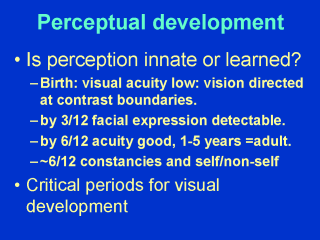 |
Perception is both innate and
learned. At birth, a newborn baby’s eyes have a rather fixed focal length at about 14-16
inches (about the distance from a mother’s breast to her eyes), and vision is
preferentially directed at face-like objects rather than other patterns, even those
consisting of facial components but mixed around. Within the face, eyes of newborns are
drawn to contrast boundaries, such as the hairline, eyebrows and mouth. For this reason, a
breast feeding baby tends to look at its mother’s face. This makes a lot of sense. By
age 3/12 (three months), the baby has begun to detect subtle changes in the mothers’
facial expression, and by 6/12, visual acuity is good. By about 5 years visual acuity is
at adult level, but perceptual acuity is far short of adult level. At the same time, 6/12,
the baby has sufficient experience of its environment that constancies begin to take over
“basic” perception, and more sophisticated perceptual elaboration becomes possible.
Prior to this time, a baby does not differentiate between self and non-self. Around 6/12,
a sense of independent existence emerges and the baby becomes aware that it may be left
alone and vulnerable. It becomes anxious when Mum leaves its perceptual field and when
strangers enter it. Research has shown that
interaction with environment is critical for normal perceptual development. If visual,
auditory and tactile inputs never have the chance to occur together, then there is no
opportunity to develop an integrated linkage between what is seen, heard and felt. One
experiment had a kitten pulling a little wagon in which was strapped a second sibling
kitten (“yolked”). The first kitten was allowed to explore its environment at will but
the yolked kitten could only passively watch. Later the two kittens were killed and their
visual cortices studied. Despite equal visual exposure, the yolked kitten had
significantly fewer cells in its visual cortex than the first kitten. Therefore, there is
no substitute for getting involved with all aspects of your environment if you want to
master them. “Get your hands dirty” is the rule if you want to learn! |
